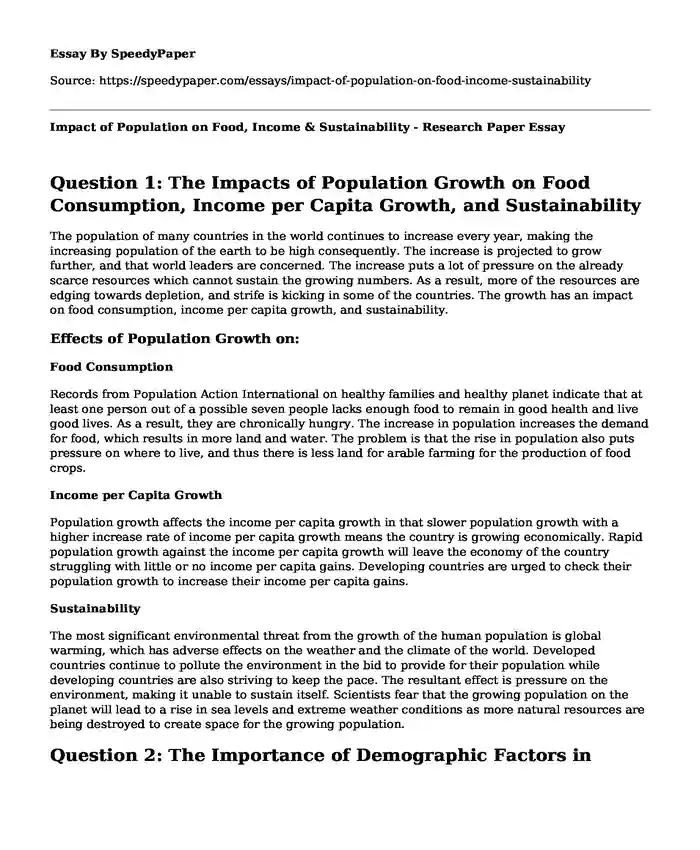Question 1: The Impacts of Population Growth on Food Consumption, Income per Capita Growth, and Sustainability
The population of many countries in the world continues to increase every year, making the increasing population of the earth to be high consequently. The increase is projected to grow further, and that world leaders are concerned. The increase puts a lot of pressure on the already scarce resources which cannot sustain the growing numbers. As a result, more of the resources are edging towards depletion, and strife is kicking in some of the countries. The growth has an impact on food consumption, income per capita growth, and sustainability.
Effects of Population Growth on:
Food Consumption
Records from Population Action International on healthy families and healthy planet indicate that at least one person out of a possible seven people lacks enough food to remain in good health and live good lives. As a result, they are chronically hungry. The increase in population increases the demand for food, which results in more land and water. The problem is that the rise in population also puts pressure on where to live, and thus there is less land for arable farming for the production of food crops.
Income per Capita Growth
Population growth affects the income per capita growth in that slower population growth with a higher increase rate of income per capita growth means the country is growing economically. Rapid population growth against the income per capita growth will leave the economy of the country struggling with little or no income per capita gains. Developing countries are urged to check their population growth to increase their income per capita gains.
Sustainability
The most significant environmental threat from the growth of the human population is global warming, which has adverse effects on the weather and the climate of the world. Developed countries continue to pollute the environment in the bid to provide for their population while developing countries are also striving to keep the pace. The resultant effect is pressure on the environment, making it unable to sustain itself. Scientists fear that the growing population on the planet will lead to a rise in sea levels and extreme weather conditions as more natural resources are being destroyed to create space for the growing population.
Question 2: The Importance of Demographic Factors in contributing to National Economic Growth using China and India together with the theory of Demographic Transition and Demographic Dividend
Various demographic factors affect the economic growth of China and India. They include age, education level, sex, income level, marital status, occupation, birth rate, religion, death rate, the average age at marriage, and the average size of families. The factors, as mentioned earlier, affect the economic growth in the countries in different ways. China has spent a lot in equipping their education centers with the knowledge to work in their industries. There are several plans on education expenditure and investment in the same. There has thus been growth in the national economic growth because of the focus on education. The same has been replicated in India, whose economy is improving too.
The level of employment in China is high as compared to that in India. India has a lot of its population living below the poverty line, while China is becoming a developed country. This is because of the different levels of employment in the country. The demographic transition of China has been witnessed in recent years due to the aging population. The aging of the population has slowed down the economic growth in China due to the exhausted demographic dividend in the country. Consequently, the cost of labor has become high because of the inequality and the poverty index in the country. India is also in the midst of a significant demographic transition, which is a consequence of the baby boom, improved access to better health care, decreased mortality rate, and better education. As a result, its demographic dividend increases, which has positive effects on the country's national economic growth.
Question 3: Generational differences in consumption and wealth accumulation behavior in Australia and Germany
There are no big generational differences in consumption and wealth accumulation between Australia and Germany. The millennials in Australia think that it is futile to save for a house at their generation, and since they cannot afford a deposit, it is better to enjoy life at the same time. They think that it is pointless saving for the future and that eating out is the most comfortable way to live. The earlier generations were more concerned about consumption and wealth accumulation that the current generation. The current generation is not used to sacrifices and is used to get things done quickly.
There is a total disregard of consumption practices in the current generation as compared to the older generation in both countries. The older generation had very few cases of obesity while the current generation cannot check their eating habits and thus are at risk of obesity and other health factors. Wealth accumulation has also been disregarded by this generation who like natural things and cannot endure the struggles to achieve something. They would instead buy expensive materials than accumulate wealth.
Cite this page
Impact of Population on Food, Income & Sustainability - Research Paper. (2023, Sep 12). Retrieved from https://speedypaper.com/essays/impact-of-population-on-food-income-sustainability
Request Removal
If you are the original author of this essay and no longer wish to have it published on the SpeedyPaper website, please click below to request its removal:
- Migrant Health - Public Health Research Paper Sample
- Aging Population as a Global Problem, Free Essay with Argument and Solution
- Essay Sample on Immigration in Texas
- Free Essay. the Role of the Commanders of the Union Military in Freeing Slaves
- Free Essay Example - Malthusianism
- Free Essay: Racial Injustices Against African Americans
- Essay Example: Promote Child and Young Person Development
Popular categories





